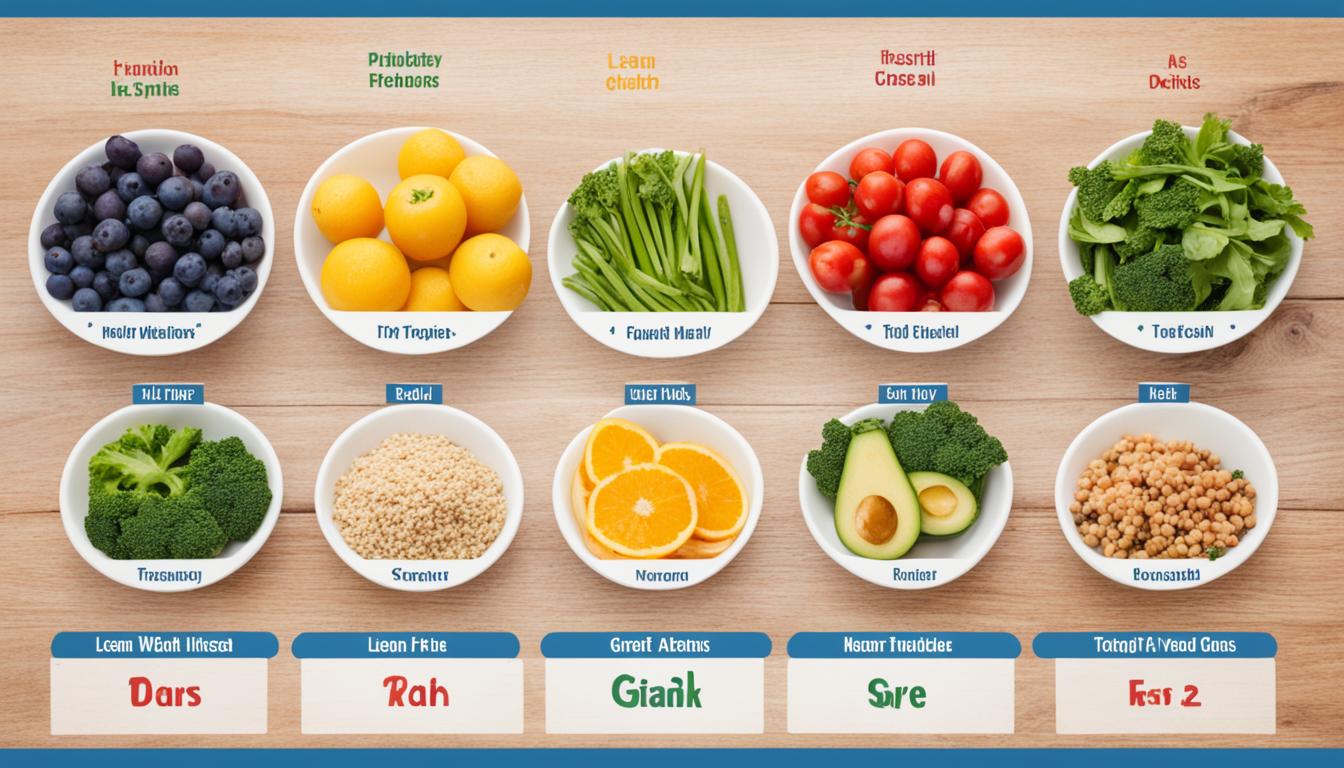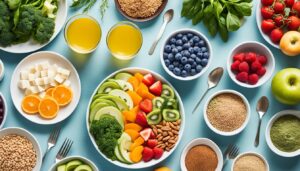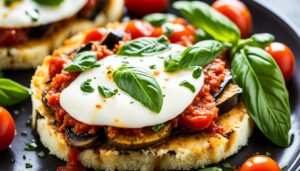Taking care of our health gets more important as we age. We all want to keep our freedom, stay active, and enjoy every day. A good diet helps us age healthily, giving us the energy and nutrients our bodies need.
Finding the right meals for seniors can seem tough with all the advice out there. That’s why we’ve put together a 7-day meal plan just for the elderly. It aims to promote healthy aging with tasty, nutrient-rich recipes that are simple to prepare.
This plan is great whether you’re cooking for yourself, someone you care for, or a senior client. It guides you in choosing nutritious foods, ensuring you get all the vital nutrients. Let’s explore how seniors can eat healthily and happily!
Key Takeaways:
- Following a healthy diet is crucial for healthy aging.
- This 7-day meal plan is tailored for elderly individuals.
- The meal plan includes delicious and easy-to-make recipes.
- It is packed with nutrients that support overall health and well-being.
- Whether cooking for yourself or a loved one, this meal plan will help you make informed choices.
Benefits of a Healthy Diet for Aging
As we get older, eating right becomes even more important. A healthy diet helps our brain stay sharp and our bones stay strong. It also keeps our eyes healthy. The Mediterranean diet is great for older adults. It’s loaded with foods that are good for you. This diet boosts heart health, lowers diabetes risk, and slows down memory loss.
Eating well helps you handle stress better and sleep more soundly. It gives you the nutrients your immune system needs to fight off sickness. A good diet does more than keep your body healthy. It also keeps your mind working well and helps you think clearly.
“A healthy diet is like a fountain of youth, providing the necessary nutrients to keep the mind sharp and the body strong.”
Choosing the right foods is key to staying healthy and lively as we age. A diet full of important vitamins and minerals helps us in many ways. It improves our quality of life as we grow older.
The Benefits of a Healthy Diet for Aging:
- Supports brain health and cognitive function
- Protects vision and eye health
- Maintains strong bones and minimizes the risk of osteoporosis
- Improves heart health and reduces the risk of cardiovascular diseases
- Helps manage stress and improves sleep quality
- Supports a healthy immune system
- Reduces the risk of type 2 diabetes and other chronic diseases
It’s clear that a healthy diet has many benefits for older adults. By choosing foods full of nutrients, seniors can take care of their health and enjoy life more.
| Benefit | Explanation |
|---|---|
| Brain Health and Cognitive Function | A nutrient-dense diet supports optimal brain function and helps prevent age-related cognitive decline. |
| Vision and Eye Health | A healthy diet rich in antioxidants and key nutrients helps protect vision and reduces the risk of eye-related conditions. |
| Bone Health | Adequate intake of calcium and vitamin D helps maintain bone density and reduces the risk of osteoporosis. |
| Heart Health | Following a healthy diet, such as the Mediterranean diet, supports heart health and reduces the risk of cardiovascular diseases. |
| Stress Management and Sleep Quality | Healthy eating contributes to better stress management and improved sleep quality, enhancing overall well-being. |
| Healthy Immune System | A well-nourished body through a healthy diet supports a robust immune system, reducing the risk of infections and diseases. |
| Reduced Risk of Chronic Diseases | A healthy diet rich in nutrients reduces the risk of developing chronic conditions like type 2 diabetes and certain cancers. |
The Role of Nutrients in Healthy Aging
Nutrients are crucial for aging well. As we get older, we might not get enough vitamins and minerals. This includes vitamin B12, iron, vitamin D, and calcium. These nutrients keep us healthy and can help prevent age-related problems.
Vitamins and minerals support our body functions. Vitamin B12 helps with nerves and making red blood cells. Iron carries oxygen and gives us energy. Vitamin D and calcium are key for strong bones and lowering osteoporosis risks.
Protein is key, especially for older adults. It helps keep muscles strong and reduces frailty risks. Eating foods like lean meats, fish, eggs, and legumes is good for getting enough protein.
Antioxidants help with aging too. They are in foods like fruits, veggies, nuts, and proteins. They fight off cell damage and lower the risk of diseases that come with age. Eating different colored fruits and veggies gives you lots of antioxidants.
“Consuming a balanced diet that is rich in essential nutrients is key to supporting healthy aging and maintaining optimal health and well-being.”
Eating a variety of nutrient-rich foods is good for aging well. It’s smart to talk to a healthcare provider for advice on nutrition. They can help you meet your nutrient needs with personalized advice.
The Importance of Essential Nutrients for Healthy Aging:
- Vitamin B12: Supports nerve function and red blood cell production.
- Iron: Essential for oxygen transport and energy production.
- Vitamin D: Promotes bone health and reduces the risk of osteoporosis.
- Calcium: Important for maintaining bone density and reducing the risk of fractures.
- Protein: Supports muscle mass, strength, and function to reduce frailty.
- Antioxidants: Protect against cellular damage and reduce the risk of age-related diseases.
The Mediterranean Diet for Healthy Aging
As seniors get older, eating right is key for good health. The Mediterranean diet is often suggested for older people. It includes whole foods like fruits, veggies, whole grains, nuts, and lean meats. At the same time, it cuts down on red meat, processed items, and added sugars. By sticking to this diet, seniors can gain many benefits that help them age well.
Benefits of the Mediterranean Diet for Aging
This diet has been well-studied and shows great promise for healthy aging. It can lower the risk of chronic diseases and boost brain health. It also supports overall well-being in older adults. Fruits and veggies in the diet give essential nutrients. These fight age-related issues and keep health at its best.
It also highlights lean proteins like fish and chicken. These foods help keep muscles strong and lower frailty risks. Healthy fats from olive oil and nuts fight inflammation and heart problems. Overall, this diet provides balanced nutrition that improves aging.
Mediterranean Diet Meal Plan for Seniors
Starting a Mediterranean diet is both practical and fun for seniors. It’s important to eat nutrient-rich foods and enjoy meals with different tastes and textures.
Here’s an example of a meal plan for seniors:
| Meal | Menu |
|---|---|
| Breakfast | Whole grain toast with avocado and smoked salmon |
| Lunch | Greek salad with mixed greens, tomatoes, cucumbers, olives, feta cheese, and grilled chicken |
| Dinner | Baked salmon with lemon and herbs, roasted veggies, and quinoa |
| Snack | Almonds and a piece of fruit |
Don’t forget to drink enough water during the day. Also, talk to a healthcare expert for advice on calories and meal plan changes.
The Mediterranean diet is both tasty and healthy for aging. It uses whole foods and a variety of flavors. So, seniors can improve their health and enjoy better life quality.
By choosing the Mediterranean diet, seniors are choosing a healthier lifestyle. This diet offers many nutrients, helps live longer, and fights chronic illnesses. For seniors wanting tasty, health-boosting meals, it’s a great option.
Building a Balanced Meal Plan for Seniors
Creating a balanced meal plan for seniors is essential. It promotes health and well-being. By adding different food groups, seniors get all necessary vitamins and nutrients.
A good meal plan for seniors includes different kinds of foods:
- Fruits and vegetables: These provide essential vitamins, minerals, and antioxidants that support various bodily functions.
- Whole grains: Opt for whole grain bread, rice, pasta, and cereals to provide fiber and sustained energy throughout the day.
- Lean proteins: Choose lean sources of protein such as poultry, fish, eggs, and legumes to support muscle health and repair.
- Healthy fats: Incorporate sources of healthy fats like avocados, nuts, seeds, and olive oil to promote heart health and reduce inflammation.
It’s key to watch portion sizes and calories for seniors. Talking with a healthcare provider helps tailor the meal plan.
Here are extra tips for seniors’ meal plans:
- Plan meals in advance: Save time each week to plan meals and make a shopping list. This ensures nutritious ingredients are on hand and reduces unhealthy food choices.
- Experiment with new recipes: Try new recipes to make meals exciting. It helps seniors enjoy their food plan.
- Include a variety of colors: Add fruits and veggies of different colors. Each color has different healthy components.
- Be mindful of sodium intake: Limit sodium to keep the heart healthy. Use fresh foods and flavor with herbs instead of salt.
- Stay hydrated: Drinking enough water is key for seniors. Aim for at least 8 glasses a day. Avoid sugary and caffeinated drinks.
By sticking to these tips and making changes as needed, seniors can have a nutritious meal plan. It supports their health and wellness.
Sample 7-Day Meal Plan for Healthy Aging
This sample 7-day meal plan is great for elderly folks. It aims to provide meals that are full of nutrients. Each day has breakfast, lunch, dinner, and snacks. They are chosen for their health benefits.
Day 1
- Breakfast: Veggie Omelet with Whole Wheat Toast
- Lunch: Mixed Green Salad with Grilled Chicken
- Dinner: Baked Salmon with Roasted Vegetables and Quinoa
- Snacks: Greek Yogurt with Berries and a handful of Almonds
Day 2
- Breakfast: Overnight Oats with Chia Seeds and Blueberries
- Lunch: Turkey and Avocado Wrap with a side of Carrot Sticks
- Dinner: Shrimp Stir-Fry with Brown Rice
- Snacks: Apple Slices with Peanut Butter
Day 3
- Breakfast: Whole Grain Pancakes with Banana Slices
- Lunch: Spinach and Feta Stuffed Chicken Breast with Quinoa
- Dinner: Baked Cod with Steamed Broccoli and Couscous
- Snacks: Trail Mix with Dried Fruits and Nuts
Day 4
- Breakfast: Greek Yogurt Parfait with Granola and Mixed Berries
- Lunch: Veggie Wrap with Hummus and a side of Snap Peas
- Dinner: Grilled Chicken Breast with Sweet Potato Mash and Roasted Brussels Sprouts
- Snacks: Hard-boiled Egg and Baby Carrots
Day 5
- Breakfast: Scrambled Eggs with Spinach and Whole Wheat Toast
- Lunch: Caprese Salad with Grilled Chicken
- Dinner: Lentil Soup with a side of Whole Grain Bread
- Snacks: Fresh Fruit Salad
Day 6
- Breakfast: Quinoa Breakfast Bowl with Mixed Berries and Almonds
- Lunch: Tuna Salad Lettuce Wraps with a side of Cucumber Slices
- Dinner: Veggie Stir-Fry with Tofu and Brown Rice
- Snacks: Celery Sticks with Hummus
Day 7
- Breakfast: Whole Wheat Toast with Smashed Avocado and Poached Eggs
- Lunch: Quinoa and Roasted Vegetable Salad with Feta Cheese
- Dinner: Grilled Steak with Sweet Potato Fries and Grilled Asparagus
- Snacks: Mixed Nuts and a Banana
This meal plan is based on 1,500 calories a day but can be adjusted. Talk to a doctor or dietitian to tailor it to your needs. And don’t forget to drink lots of water to stay hydrated.
Nutritional Information and Modifications
The 7-day meal plan for the elderly offers nutritional info and changes for various needs. It includes daily calories and nutrient details. You can adapt it for 1,200 or 2,000 calories per day.
Different factors like age and health affect how many calories you need. For advice tailored to you, talk to a dietitian or doctor.
Calorie Modifications for Senior Meal Plan
There are two ways to adjust the meal plan’s calories:
- 1,200 Calorie Plan: This is for those needing fewer calories or wanting to lose weight. It adjusts portions and food choices to lower calories but stays balanced.
- 2,000 Calorie Plan: This is for those needing more calories, perhaps due to being more active. It increases portions and adds foods to reach the calorie goal, ensuring nutrition.
The meal plan is flexible, letting you adjust calories to meet your needs. Below is a table with daily calorie counts and nutrient breakdowns for each option:
Nutritional Information for Elderly Meal Plan
The meal plan is made to give older adults the nutrients they need. It has a mix of foods for health and satisfaction.
Here are some nutrition highlights:
- Macronutrients: It balances carbs, proteins, and fats per healthy aging guidelines. This supports energy, muscles, and fullness.
- Fiber: With whole grains, fruits, and veggies, it helps digestion and regularity.
- Vitamins and Minerals: Fruits, veggies, and lean proteins provide essential nutrients. These are key for health, immunity, and preventing illness.
- Hydration: Drinking enough is crucial for seniors. The plan promotes water and other fluids all day.
This plan focuses on meeting elderly nutritional requirements. It also keeps meals tasty and varied.
Meal Prep Tips for Seniors
Meal prep can change the game for seniors who want to eat well. It helps save time, cut down on junk food, and keep healthy meals ready. Here are easy tips for meal prep:
1. Make a Shopping List
Start with a shopping list. Write down what you need for your meals and everyday items. This keeps you organized and ready to cook.
2. Choose Recipes Strategically
Pick recipes that are easy to divide and keep. Choose ones you can make a lot of and freeze, like soups and casseroles. You can cook once and have meals ready for later.
3. Prepare Food Ahead of Time
Set aside time every week to get ingredients ready. Wash and cut up fruits and veggies, and cook your grains and proteins. Putting them in containers or bags saves time later.
4. Use Storage Containers Wisely
Get different sized containers for storing food. Choose ones that are safe for the microwave and freezer. Label them with the date and what’s inside to stay organized.
5. Plan for Variety
Make sure to prep different foods. Use various proteins and lots of colorful fruits and veggies. This makes meals interesting and nutritious.
“Meal prep can save time, cut down on junk food, and keep healthy meals ready.”
6. Stay Organized
Have a specific spot for meal prep items in your kitchen. Use clear bins to see everything easily. This helps keep meal making simple.
7. Don’t Forget Snacks
Include snacks in your meal prep. Prepare fruits, veggies, nuts, or homemade bars. These keep you from getting too hungry between meals.
8. Experiment and Have Fun
Meal prep lets you try new flavors and dishes. Don’t be afraid to test out different ingredients. Enjoy your food prep time and the tasty results.
By using these tips, seniors can manage their diets, save time, and eat nutritiously.
Supporting Healthy Aging Through Diet and Lifestyle
Eating well is just one piece of the puzzle for staying healthy as we age. Other lifestyle choices play a big role too. By adding these habits to their daily lives, older adults can feel better and live well.
- Regular Exercise: Moving your body regularly is key as you get older. Lifting weights keeps bones and muscles strong. Doing weight-bearing exercises like walking or jogging helps with balance and coordination. Try to get 150 minutes of medium-hard exercise a week, plus strength exercises twice a week.
- Stress Management: Long-term stress is bad for your body and mind. Older adults should find ways to manage stress. This could be through deep breathing, meditation, or fun hobbies.
- Quality Sleep: Sleeping well is crucial for good health. Older adults need 7-9 hours of good sleep every night. Set a regular sleep schedule, make your sleeping area comfortable, and have a calming routine before bed to help you sleep better.
- Social Connections: Keeping in touch with people is very important for your mental health. Seniors should try to keep connected with family and friends. They can also join groups or volunteer to meet new people.
“By combining a nutritious diet with regular exercise, stress management techniques, quality sleep, and social connections, seniors can proactively support their health, improve their well-being, and age gracefully.”
By living these healthy habits, older adults can boost their energy, stay independent, and have a better life as they get older.
Importance of Hydration and Fluid Intake for Seniors
It’s vital for seniors to drink enough water to stay healthy. As they get older, their risk of dehydration goes up. This is due to less thirst and the effects of some medicines. Drinking water helps keep their bodies working right. It helps avoid health problems and supports a healthy life as they age.
Seniors need to drink a good amount of water every day. Experts suggest 9 cups for women and 13 cups for men. But, the right amount can change. It depends on how active they are, their health, and the weather.
Drinking enough water has many benefits for older adults. It keeps the body functions smooth, like digestion and blood flow. It also helps their brain work better, gives them energy, and keeps their joints healthy.
Drinking water regularly can prevent dehydration. Dehydration can cause tiredness, confusion, and other symptoms. Seniors should keep track of how much water they drink each day.
Seniors can also get water from other drinks and foods. They can drink herbal teas and eat fruits like watermelon and oranges. But, it’s best to avoid too much sugar from sodas and fruit juices. These can add too many calories and are not good for health.
Hydration Tips for Seniors:
- Carry a reusable water bottle to ensure easy access to water throughout the day.
- Set reminders or use smartphone apps to track fluid intake and prompt regular hydration.
- Include hydrating foods, such as soups, fruits, vegetables, and yogurt, in the daily diet.
- Drink water before, during, and after physical activity.
- Limit caffeine and alcohol intake, as they can have a diuretic effect and contribute to dehydration.
- Consider using flavor-enhancing infusions like lemon or cucumber to make water more appealing.
Staying hydrated is key to a healthy lifestyle for seniors. By drinking enough and choosing the right fluids, they can keep their health and function well. They will feel better overall.
Conclusion
It’s key for seniors to eat healthy to stay well. This 7-day meal plan helps them eat nutrient-rich foods every day. It’s a practical way to make sure they get balanced meals.
This meal plan focuses on important nutrients like vitamins and antioxidants. These help seniors stay healthy and lower the chance of getting chronic illnesses. The Mediterranean diet is a big part of this plan. It’s good for the brain and heart because it has lots of whole foods.
Meal prep is really important for aging well. It saves time and ensures seniors have healthy meals ready. By using this plan and tweaking it to their needs, seniors can eat tasty, healthy food. This will help them keep feeling strong and live a better life.





